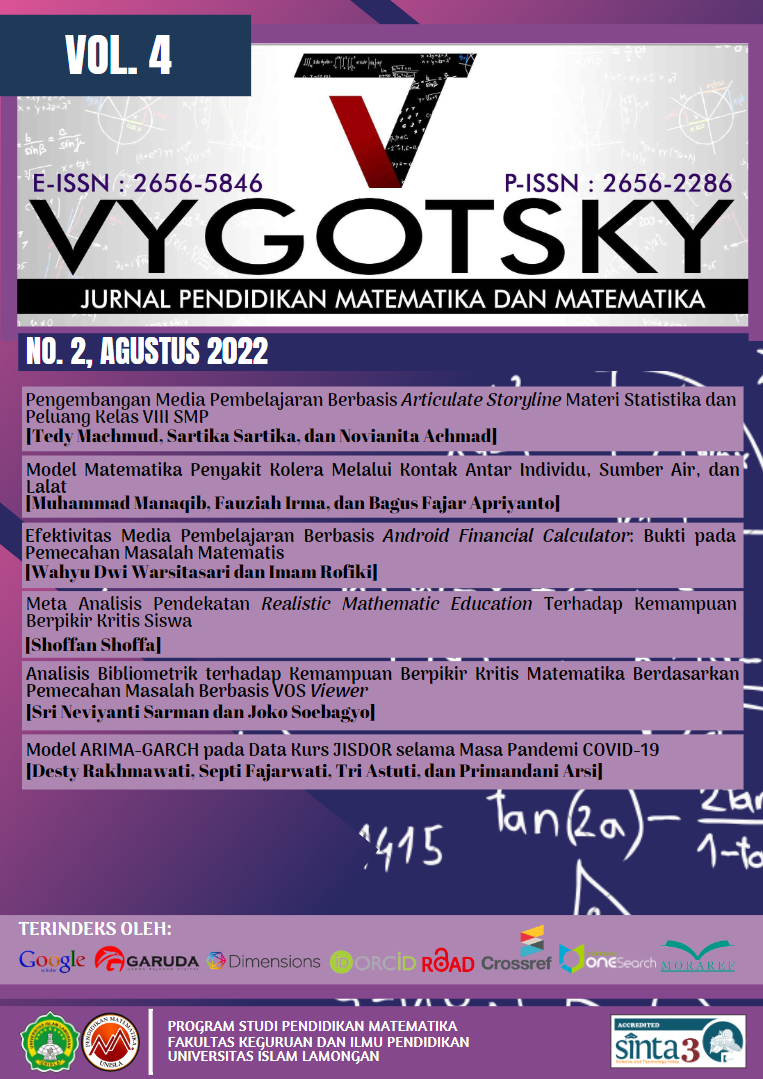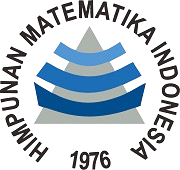Meta Analisis Pendekatan Realistic Mathematic Education Terhadap Kemampuan Berpikir Kritis Siswa
DOI:
https://doi.org/10.30736/voj.v4i2.571Keywords:
Berpikir Kritis, Pendekatan Realistik, RMEAbstract
Penelitian meta analisis ini mempunyai bertujuan untuk mengetahui keefektifan pembelajaran matematika dengan pendekatan RME terhadap kemampuan berpikir kritis siswa menggunakan perhitungan effect size 9 artikel penelitian yang diambil dari digital library kisaran tahun 2015-2021 (Oktober). Teknik pengambilan sampelnya Non-probability Sampling. Hasil meta analisis menunjukkan bahwa dalam menerapkan pendekatan RME tidak ada ketentuan khusus dalam memilih materi pembelajaran namun untuk penerapannya lebih efektif dilakukan pada jenjang SD dibuktikan dengan nilai effect size yang lebih tinggi dari jenjang yang lain. Saran bagi peneliti selanjutnya dalam meta analisis pendekatan realistik terhadap kemampuan berikir kritis siswa, diusahakan jarak pengumpulan artikel lebih dari 10 tahun sehingga data analisisnya sangat memuaskan dan perlu diperhatikan juga sumber yang relevannya terhadap artikel yang dijadikan referensi.Downloads
References
Adiputra, I. M. S., Trisnadewi, N. W., Oktaviani, N. P. W., Munthe, S. A., Hulu, V. T., Budiastutik, I., Faridi, A., Ramdany, R., Fitriani, R. J., Tania, P. O. A., Rahmiati, B. F., Lusiana, S. A., Susilawaty, A., Sianturi, E., & Suryana. (2021). Book chapter metodologi penelitian kesehatan (R. Watrianthos & J. Simarmata, Eds.). Yayasan Kita Menulis.
Amalia, E., Surya, E., & Syahputra, E. (2017). The effectiveness of using problem based learning (PBL) in mathematics problem solving ability for junior high school students. International Journal of Advance Research and Innovative Ideas in Education, 3, 3402–3406.
Bissell, A. N., & Lemons, P. P. (2006). A new method for assessing critical thinking in the classroom. BioScience, 56(1). https://doi.org/10.1641/0006-3568(2006)056[0066:ANMFAC]2.0.CO;2
Cotter, E. M., & Tally, C. S. (2009). Do critical thinking exercises improve critical thinking skills? Educational Research Quarterly, 33(2).
Cummings, N. (1977). Beyond Feelings: A Guide To Critical Thinking. In Teaching Philosophy (Vol. 2, Issue 3).
Dani, S., Pujiastuti, H., & Sudiana, R. (2017). Pendekatan realistic mathematics education untuk meningkatkan kemampuan generalisasi matematis siswa. Jurnal Penelitian Dan Pembelajaran Matematika, 10(2). https://doi.org/10.30870/jppm.v10i2.2043
Edwar, E., Puteri, R. I. I., & Zulkardi, Z. (2021). Professionalism development of high school teachers in improving the ability to implement realistic mathematics education in East OKU Regency. Proceedings of the Eighth Southeast Asia Design Research (SEA-DR) & the Second Science, Technology, Education, Arts, Culture, and Humanity (STEACH) International Conference (SEADR-STEACH).
Erlina, A. P. N., Widodo, S., & Handayani, A. D. (2021). Meta – analisis: Peningkatan kemampuan berpikir kritis siswa melalui implementasi pembelajaran kontekstual. Vygotsky: Jurnal Pendidikan Matematika Dan Matematika, 3(2), 111. https://doi.org/10.30736/voj.v3i2.403
Florea, N. M., & Hurjui, E. (2015). Critical Thinking in Elementary School Children. Procedia - Social and Behavioral Sciences, 180. https://doi.org/10.1016/j.sbspro.2015.02.161
Glass, G. v. (1976). Primary, secondary, and meta-analysis of research. Educational Researcher, 5(10), 3. https://doi.org/10.2307/1174772
Jeheman, A. A., Gunur, B., & Jelatu, S. (2019). Pengaruh pendekatan matematika realistik terhadap pemahaman konsep matematika siswa. Mosharafa: Jurnal Pendidikan Matematika, 8(2). https://doi.org/10.31980/mosharafa.v8i2.454
Juandi, D., Kusumah, Y. S., & Tamur, M. (2022). A Meta-analysis of the last two decades of realistic mathematics education approaches. International Journal of Instruction, 15(1), 381–400. https://doi.org/10.29333/iji.2022.15122a
Kholili, A., Shoffa, S., & Soemantri, S. (2021). Pembelajaran matematika model discovery learning terhadap kemampuan berpikir kreatif siswa: Kajian meta analisis. Jurnal Pembelajaran Matematika Inovatif, 4(6). https://doi.org/10.22460/jpmi.v4i6.1441-1452
Khotimah, S. H., & As’ad, M. (2020). Pendekatan pendidikan matematika realistik terhadap hasil belajar matematika siswa sekolah dasar. Jurnal Imiah Pendidikan Dan Pembelajaran, 4(3).
Kurnia Asih, A., Bambang Irawan, E., & Sa, C. (2017). Penerapan realistic mathematics education untuk meningkatkan kemampuan berpikir kritis siswa kelas V. Jurnal Pendidikan: Teori, Penelitian, Dan Pengembangan, 2(4), 524–530. http://journal.um.ac.id/index.php/jptpp/
Nur, F., & Angriani, A. D. (2021). Meta analisis: Pengaruh penerapan pendekatan realistic mathematics education terhadap hasil belajar siswa di sekolah dasar. AULADUNA: Jurnal Pendidikan Dasar Islam, 8(1). https://doi.org/10.24252/auladuna.v8i1a9.2021
Nurhasanah, Sutrisno, L., & Tiur M.S, H. (2015). Pengaruh Problem Based Learning pada Hasil Belajar Fisika: Sebuah META-ANALISIS Artikel Jurnal Online Indonesia. 151, 10–17. https://doi.org/10.1145/3132847.3132886
Page, M. J., Moher, D., Bossuyt, P. M., Boutron, I., Hoffmann, T. C., Mulrow, C. D., Shamseer, L., Tetzlaff, J. M., Akl, E. A., Brennan, S. E., Chou, R., Glanville, J., Grimshaw, J. M., Hróbjartsson, A., Lalu, M. M., Li, T., Loder, E. W., Mayo-Wilson, E., Mcdonald, S., … Mckenzie, J. E. (2021). PRISMA 2020 explanation and elaboration: Updated guidance and exemplars for reporting systematic reviews. In The BMJ (Vol. 372). https://doi.org/10.1136/bmj.n160
Paul, R., & Elder, L. (2006). Critical Thinking: The Nature of Critical and Creative Thought. Journal of Developmental Education, 30(2).
Prafianti, R. A. (2019). Pengaruh pendekatan matematika realistik terhadap disposisi matematis siswa. Vygotsky: Jurnal Pendidikan Matematika Dan Matematika, 1(1), 36. https://doi.org/https://doi.org/10.30736/vj.v1i1.91
Priatmoko, A. P., Karim, K., & Sukmawati, R. A. (2018). Mengembangkan kemampuan berpikir kreatif siswa melalui pendekatan matematika realistik. EDU-MAT: Jurnal Pendidikan Matematika, 6(1). https://doi.org/10.20527/edumat.v6i1.5125
Risdianto, E., & Cs, M. (2019). Analisis pendidikan Indonesia di era revolusi industri 4.0.
Seventika, S. Y., Sukestiyarno, Y. L., & Mariani, S. (2018). Critical thinking analysis based on Facione (2015) - Angelo (1995) logical mathematics material of vocational high school (VHS). Journal of Physics: Conference Series, 983(1). https://doi.org/10.1088/1742-6596/983/1/012067
Shoffa, S. (2009). Pengembangan perangkat pembelajaran matematika dengan pendekatan PMR pada pokok bahasan jajargenjang dan belahketupat. DIDAKTIS: Jurnal Pendidikan Dan Ilmu Pengetahuan, 9(3), 1–16.
Shoffa, S., Holisin, iis, Palandi, J. F., Cacik, S., Indriyani, D., Supriyanto, E. E., Basith, A., & Giap, Y. C. (2021). Perkembangan Media Pembelajaran Di Perguruan Tinggi. Agrapana Media.
Shoffa, S., Mustaji, M., & Arianto, F. (2022). The Influence of the DOCAR Model on the Critical Thinking of Junior High School Students. International Journal of Social Science And Human Research, 05(06), 2465–2474. https://doi.org/10.47191/ijsshr/v5-i6-72
Snyder, L. G., & Snyder, M. J. (2008). Teaching critical thinking and problem solving skills how critical thinking relates to instructional design. The Delta Pi Epsilon Journal, 1(2), 90–100.
Syarifah, L., Holisin, I., & Shoffa, S. (2021). Meta analisis: Model pembelajaran project based learning.
Tong, D. H., Nguyen, T. T., Uyen, B. P., Ngan, L. K., Khanh, L. T., & Tinh, P. T. (2022). Realistic mathematics education’s effect on students’ performance and attitudes: A case of ellipse topics learning. European Journal of Educational Research, 11(1), 403–421. https://doi.org/10.12973/eu-jer.11.1.403
Utami, F. N., & Indarini, E. (2021). Meta Analisis Pengaruh Pendekatan Matematika Realistik Terhadap Kemampuan Berpikir Kritis Pada Matematika Siswa di Sekolah Dasar. Jurnal Basicedu, 5(2). https://doi.org/10.31004/basicedu.v5i2.852
Utarni, H., & Mulyatna, F. (2020). Penerapan pembelajaran realistic mathematics education dengan strategi means ends analysis untuk meningkatkan kemampuan berpikir kritis. ARITHMETIC: Academic Journal of Math, 2(1), 15. https://doi.org/10.29240/ja.v2i1.1399
Downloads
Published
How to Cite
Issue
Section
License
Copyright:
Authors who publish their manuscripts in this Journal agree to the following conditions:
- Copyright of any article on Vygotsky: Jurnal Pendidikan Matematika dan Matematika is held solely by the author under the Creative Commons Attribution 4.0 International license (CC BY NC SA).
- Authors can submit papers separately, arrange non-exclusive distribution of manuscripts that have been published in this journal into other versions (e.g. sending to the author's institutional repository, publication in a book, etc.) by acknowledging that the manuscript has been published for the first time in Vygotsky: Jurnal Pendidikan Matematika dan Matematika.
License:
Vygotsky: Jurnal Pendidikan Matematika dan Matematika is published under the terms of the Creative Commons Attribution 4.0 International License (CC BY NC SA). This license permits anyone to copy and redistribute this material in any form or format, compile, modify and develop this material for any purpose as long as it is not for commercial purposes. Additionally, anyone must provide credit and distribute contributions under the license of the creator of the original work.







